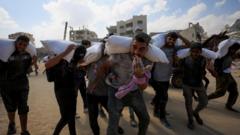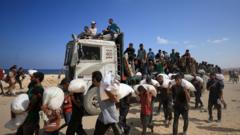Amid escalating humanitarian concerns, the UK and 27 other nations have urged an urgent ceasefire in Gaza, critiquing Israel's aid delivery practices and highlighting the dire situation of civilians caught in the violence.
UK and 27 Nations Demand Ceasefire and Aid Reform Amid Gaza Crisis

UK and 27 Nations Demand Ceasefire and Aid Reform Amid Gaza Crisis
International community urges immediate halt to conflict, condemning civilian casualties in Gaza during aid-seeking efforts
In a significant joint statement, the UK and 27 other nations have called for an immediate cessation of hostilities in Gaza, where they assert that civilian suffering has skyrocketed. The group condemned the “drip feeding” of humanitarian aid and referred to the "inhumane killing of civilians" attempting to secure basic necessities like food and water. Recent reports from Gaza's Hamas-run health ministry indicate that over 100 Palestinians died at the hands of Israeli forces while awaiting food over the weekend, with additional deaths attributed to malnutrition.
Israel’s foreign ministry dismissed the countries’ concerns, claiming the statement misrepresents the situation and lends support to Hamas, which they accused of obstructing aid distribution and perpetuating the conflict. This has sparked a renewed international debate over the conflict's handling, yielding notable statements from influential foreign ministers from nations including Australia, Canada, France, and Japan.
The declaration asserted that "the war in Gaza must end now,” citing alarming reports of civilian deaths, with the statement confirming that more than 800 individuals have died while pursuing food since the partial easing of blockades began in May. The humanitarian aid system recently put in place—a collaboration involving the Gaza Humanitarian Foundation and the US—was critiqued for being unsafe and in violation of humanitarian principles by the UN and other partners.
The World Food Programme highlighted a new peak in Gaza's hunger crisis, stating that 90,000 women and children are in urgent need of nutritional assistance. Furthermore, the Hamas-run health ministry noted alarming rates of malnutrition, with doctors warning about impending "mass deaths" due to lack of food and medical supplies.
Patients in hospitals are struggling due to severe food shortages, and reports from local residents illustrate the desperation they face. One father lamented that his children are left to cry from hunger, citing exorbitant prices for basic food items.
The statement from the coalition of nations also condemned Israeli proposals of relocating Gaza's inhabitants to a designated humanitarian city, asserting such forced displacement breaches international law. They have expressed readiness to take further action and pursue a peaceful resolution through a permanent ceasefire.
Amidst the international outcry, Israeli officials have continued to place the blame on Hamas, maintaining that they abide by international law in their humanitarian efforts and accusing the militant group of escalating tensions. The conflict has been ongoing since the Hamas-led assault on Israel earlier this month, which resulted in significant casualties on both sides. The situation remains fluid as the international community navigates the complexities of this humanitarian crisis.
Israel’s foreign ministry dismissed the countries’ concerns, claiming the statement misrepresents the situation and lends support to Hamas, which they accused of obstructing aid distribution and perpetuating the conflict. This has sparked a renewed international debate over the conflict's handling, yielding notable statements from influential foreign ministers from nations including Australia, Canada, France, and Japan.
The declaration asserted that "the war in Gaza must end now,” citing alarming reports of civilian deaths, with the statement confirming that more than 800 individuals have died while pursuing food since the partial easing of blockades began in May. The humanitarian aid system recently put in place—a collaboration involving the Gaza Humanitarian Foundation and the US—was critiqued for being unsafe and in violation of humanitarian principles by the UN and other partners.
The World Food Programme highlighted a new peak in Gaza's hunger crisis, stating that 90,000 women and children are in urgent need of nutritional assistance. Furthermore, the Hamas-run health ministry noted alarming rates of malnutrition, with doctors warning about impending "mass deaths" due to lack of food and medical supplies.
Patients in hospitals are struggling due to severe food shortages, and reports from local residents illustrate the desperation they face. One father lamented that his children are left to cry from hunger, citing exorbitant prices for basic food items.
The statement from the coalition of nations also condemned Israeli proposals of relocating Gaza's inhabitants to a designated humanitarian city, asserting such forced displacement breaches international law. They have expressed readiness to take further action and pursue a peaceful resolution through a permanent ceasefire.
Amidst the international outcry, Israeli officials have continued to place the blame on Hamas, maintaining that they abide by international law in their humanitarian efforts and accusing the militant group of escalating tensions. The conflict has been ongoing since the Hamas-led assault on Israel earlier this month, which resulted in significant casualties on both sides. The situation remains fluid as the international community navigates the complexities of this humanitarian crisis.




















